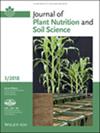Wheat Growth, Yield and Metal Uptake From a Cadmium and Lead Contaminated Soil Following Pressmud and Phosphate Fertilizer Application
Abstract
Background
The use of wastewater for crop irrigation may introduce toxic metals into soils, leading to the contamination of food crops. This may result in reduced crop productivity and food adulteration.
Aims
This study aimed to characterize pressmud (PM) and to evaluate the effect of PM and single super phosphate (SSP) on wheat yield and the associated health risks of consuming wheat grains grown on metal-contaminated soil.
Methodology
Eight PM samples, collected from different sugar industries, were characterized. Subsequently, a pot experiment was conducted on a metal-contaminated soil to evaluate the effect of PM (control, 10 and 20 g kg−1 soil) and SSP (0 and 250 mg kg−1 soil) on wheat growth, yield, metal concentration in grains, and health risk index.
Results
The mean values of the various parameters of the PM samples were as follows: electrical conductivity 4.81 dS m−1, pH 5.74, cation exchange capacity 66 meq 100 g−1, nitrogen 1.53%, phosphorus 1.26%, potassium 0.72%, organic carbon 36.04%, lead (Pb) 1.32 mg kg−1, cadmium (Cd) 8 µg kg−1, surface area 7.925 m2 g−1, total pore volume 0.0219 cm3 g−1 and pore diameter 27.33 nm. FTIR revealed the presence of various functional groups that might play a role in metal adsorption within the soil. Results from the pot experiment showed that PM increased the grain yield by 131% compared to control; however, it was at par with the SSP treatment. The increase in grain yield in PM amended soil was linked to improved nutrient acquisition and decreased metal accumulation. PM -amended soil had higher concentration of nitrogen, phosphorus, and potassium compared to unamended soil, resulting in 2.96-, 1.85- and 2.42-fold higher grain contents, respectively. Moreover, PM decreased the accumulation of Cd and Pb in grains by 48% and 56%, respectively, compared to control, whereas the effect of SSP was nonsignificant. Health risk indices for consuming Cd- and Pb-contaminated grains were 1.18 and 6.48, respectively; however, the addition of PM decreased these values to 0.53 and 3.48.
Conclusions
PM improves wheat productivity and reduces health risks for humans associated with the consumption of wheat grains grown on the metal-contaminated soil.

 求助内容:
求助内容: 应助结果提醒方式:
应助结果提醒方式:


